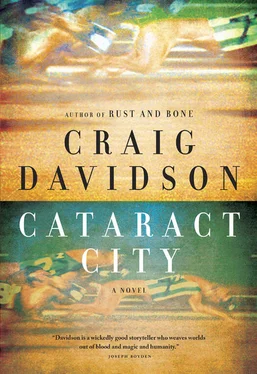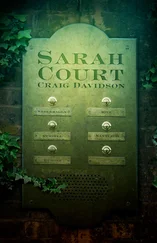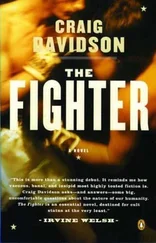We found Drinkwater’s fire, its embers still flaring with the wind. He’d fashioned a lean-to, the ends of which he’d whittled and slotted flush. He must have draped it with an emergency blanket and hunkered inside — he may have even gotten an hour or two of sleep. It was the campsite of a seasoned outdoorsman, assembled with ease, abandoned quickly.
A frozen pool of blood lay next to the fire. The blood had a matte look, platelets frozen to a dull gloss. I chipped at it with my thumbnail. It wasn’t frozen solid, the way water freezes; it was softer, the consistency of a Fudgsicle. I tweezed a needle out of the blood, attached to a hank of black thread. Had Drinkwater stitched himself up?
“He knows we’re following him,” Dunk said.
“How do you figure?”
He pointed ten yards past the fire. Drinkwater had unzipped and relieved his bladder, scrawling a message in the snow.
F.U.
“He even got the periods in there between the letters,” Duncan marvelled.
The sun climbed a cloudless sky, lacking the wavering edge it held on summer days: looking at it was like staring into a blast furnace through a hole cut in blue Bristol board. Still, it was better to look into the sky or straight ahead. Staring down brought on the oddest vertigo, the snow sizzling like a lake of fire.
Duncan began to cough. He pressed a fist to his chest as it built to a rumbling thunder rolling through his lungs. I could tell he was in serious pain, his face wrenched into a tortured expression — he looked as if a thousand fish hooks were tugging inside his chest. He doubled over, palms braced on his knees. He coughed until tears rolled down his cheeks. When the coughing finally tapered he tried to stand up, but his boots skidded in the snow and he fell to his knees, then forward onto his hands. He spat. A red splotch hit the snow. He tried to cover it up so I wouldn’t see but the blood just churned into the snow, making it pink.
After a while I said, “Need a hand up?”
“If I can’t get up on my own, we’ve got trouble.” He rose unsteadily, and we carried on.
Drinkwater’s tracks cut through the snow on a determined line — looking at them, you’d think they’d been made by a man who knew exactly where he was going, or at least had no fear of what lay ahead. In my mind I imagined an animal travelling on four legs rather than two. Drinkwater’s nose was the black of a dog’s nose. One of his eyes was milky, the result of some past scrap. We were following a cunning old lion — and he knew he was being followed.
The land unfurled in terrifying swathes of arctic whiteness to every point on the compass. My toes had gone numb without my realizing. Idly, I wondered how long it would take for frostbite to set in. I’d seen a TV show about mountain climbers trapped on a cliff during a snowstorm. One of them, a smiling blond Swede, lost eight toes and seven fingers to frostbite. He kept them in a mason jar. The amputated digits were black, as if they’d been spray-painted. The sunny Swede said they’d just snapped off, especially the toes. He’d taken his boot off to find them rolling around in the heel like black licorice jujubes. He was incredibly well adjusted to his loss.
As we walked, I sang old camp songs. It wasn’t wise to announce our whereabouts, but the tunes kept the oppressive silence at bay.
“ Land of the silver birch ,
home of the weasel ,
Where still the mighty moose
wanders at will .
Blue lake and rocky shore ,
I will return once more .
Boom diddy-yaa daa, boom diddy-yaa daa ,
Boo-hoo-ooo-hooo-oom .”
Duncan said: “Pretty sure it’s ‘Land of the silver birch, home of the beaver .’”
“Really? I like weasel better.”
Drinkwater’s tracks stopped, went forward again, seemed to hesitate (judging from the depth of the imprint), then backtracked fifty yards to veer into a dense thicket. The shrubs were bare where Drinkwater had picked his way through; snow sifted off their limbs. I wondered what had caused him to change course.
The snow ran deep between the shrubs, almost knee high. We hit a natural laneway between the foliage, about two yards wide. There were animal tracks in the snow, roughly the size of a dog’s paw prints. Drinkwater’s bootprints were not as deeply impressed here: for a few steps they were barely visible at all before re-establishing themselves on the far side of the laneway. I stepped forward and—
“Stop!”
Duncan’s hand was hooked in my collar.
“It’s a fox run,” he said. “Silver foxes, probably.”
“So?”
“Don’t move.”
He dug in the satchel for the battery and lobbed it at the faintest of Drinkwater’s bootprints. The trap sprang out of the snow, teeth colliding with a metallic schnik .
Duncan pointed at a ring of dull yellow spray-painted around the trunk of a poplar tree. “A trapper’s marker. Drinkwater must have seen that, found the baited trap, sprung it, reset it, covered it with snow. Then he stepped past the fox run, walked back down his own bootprints — he probably walked backwards, looking over his shoulder to make sure his boots came down exactly where they’d been — then took off one of his boots and made a print in the snow right over the trap.”
I could picture it perfectly: Drinkwater balanced on one leg with his socked foot outstretched.
Duncan said, “Christ, he’s crafty.”
“It didn’t work, you prick!” My voice rose into the icy altar of sky, going out and out. The sound settled into silence — at which point another voice may have come back, a soft, wavering note.
It will — ill — ill — ill …
It was that point in winter where afternoons were non-existent. First there was morning, sun twinkling off the snow. Next came a terminal grey interregnum, after which twilight swiftly fell.
The sun began to set, very red and cold. The twilight was growing teeth by the time we came upon a steep ridge. Our shadows stretched across the snow, outlines liquefying into the dusk. Wind scrawled the ridge’s whitened edge, helixes of snow spiralling. Darkness locked the cold into our bones; the Mylar-wrapped coals in our pockets were long dead. Drinkwater’s footprints picked a cautious path down the ridge. At a depth of twenty yards they, too, softened into the encroaching dusk.
Duncan’s breaths were ragged and phlegmy; he’d been stopping often to hack up blood. Twice in the last hour he’d collapsed, coughing helplessly. Not one familiar signpost had carved itself out of the terrain. I found it remarkable that two men could live nearly their whole lives in one place and still be completely disoriented by the wilderness that surrounded it. A band of fear tightened round my heart.
Clouds scudded the horizon. A snowflake touched the nape of my neck. We didn’t want to be stuck atop this bluff when night came down.
“Lower ground’s better, Dunk. Even if we manage to make a fire up here, it could blow out.”
“Long way down,” Duncan said, his body angled against the wind as it howled up the ridge.
“Not from where I’m looking.”
The decline was clad in shadows, the basin nothing but a grey gulf — it wasn’t a long way down so much as an indeterminate way down. Our heels dug into the ridge. In the summer it’d be treacherous, but now, the rocks encased in ice, it was deadly. Saplings clung to the snow-clad shale. I grabbed one and stumbled back as it tore out of the ground, its roots as flimsy as threads.
Snow fell with sudden aggression, filling in the prints we were desperately following. A rough path presented itself: a series of rocky shelves switchbacking down and down. One misstep would send us tumbling over the edge. We inched down with hesitant stutter-steps. Sheaves of snow threw crystalline lancets at my eyes. I squeezed my eyelids shut and opened them as another gust raced away with my breath. Blood beat hotly at my temples yet I was colder than I could ever recall. It was no surprise to discover frost crystallizing on my face.
Читать дальше












